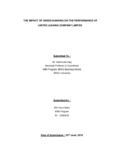| dc.description.abstract | Green Banking is the operation of the financial sector with special focus on the environmental,
ecological and social factors, targeting conservation of nature and natural resources. The term
broadly encompasses awareness creation and promotion of environment-and-society-friendly
projects and practices, and reduction of overall carbon footprint from both its financing and inhouse
operations. Through Green Banking, the FIs are not only required to improve their own
standards, but also play an active role in demanding the same from its stakeholders. The state
of environment in Bangladesh is rapidly deteriorating. The key areas of environmental
degradation cover air pollution, water pollution and scarcity, encroachment of rivers, improper
disposal of industrial, medical and household waste, deforestation and loss of open space and
loss of biodiversity. In addition, Bangladesh is one of the most climate change vulnerable
countries. In line with global development and response to the environmental degradation,
financial sector in Bangladesh should play important roles as one of the key stake holders.
Although FIs are considered environment friendly and do not impact the environment greatly
through their own internal operations, the external impact on the environment through their
customers activities is substantial. The financial sector is one of the major sources of financing
industrial projects such as steel, paper, cement, chemicals, fertilizers, power, textiles, etc.,
which cause maximum carbon emission. Therefore, FIs can play an intermediary role between
economic development and environmental protection, for promoting environmentally sustainable
and socially responsible investment. So, to aid the reduction of external carbon emission, like
other FIs, ULC should finance green technology and pollution reducing projects.
The approach of ULC to sustainability is based on a broad understanding of its duties as a
provider of financial services, its responsibilities to society and the environment and also its role
as an employer. Its approach also shows the importance the company gives to its dialogue with
its stakeholders. ULC is seriously considering to adopt Green Banking with a view to enhancing
CAMEL rating, getting approval from the central bank to open up new branches and becoming
one of the top ten FIs in Bangladesh. The factors that have influenced ULC to adopt Green
Banking are: economic factors, policy guidelines, loan demand, stakeholders’ pressure and
environmental interest. ULC is trying to curb its usage of electricity, though on the other hand,
the consumption of fuel is erratic. ULC needs serious steps to check its fuel consumption in an
efficient manner.ULC has seen its success in reducing paper consumption. With the advent and
implementation of latest technology in the operation, ULC is heading toward very less paper
consumption. ULC has commendable achievement in noise reduction, decreasing CO2
emission and electricity load reduction. This has been possible mainly because of ULC’s due
diligence checklist and special environmental concern while investing.
Sustainable development and preservation of environment are now recognized globally as
overriding imperatives to protect our planet from the ravages inflicted on it by mankind. A
common thread running across all these initiatives is the focus on reducing the demand for
fossil fuels by implementing the 3R's viz. Reduce, Reuse and Recycle. Drafting of any policy is
not enough to go green for any financial institution. The management has to be serious enough
to implement the policy rigorously. | en_US |

